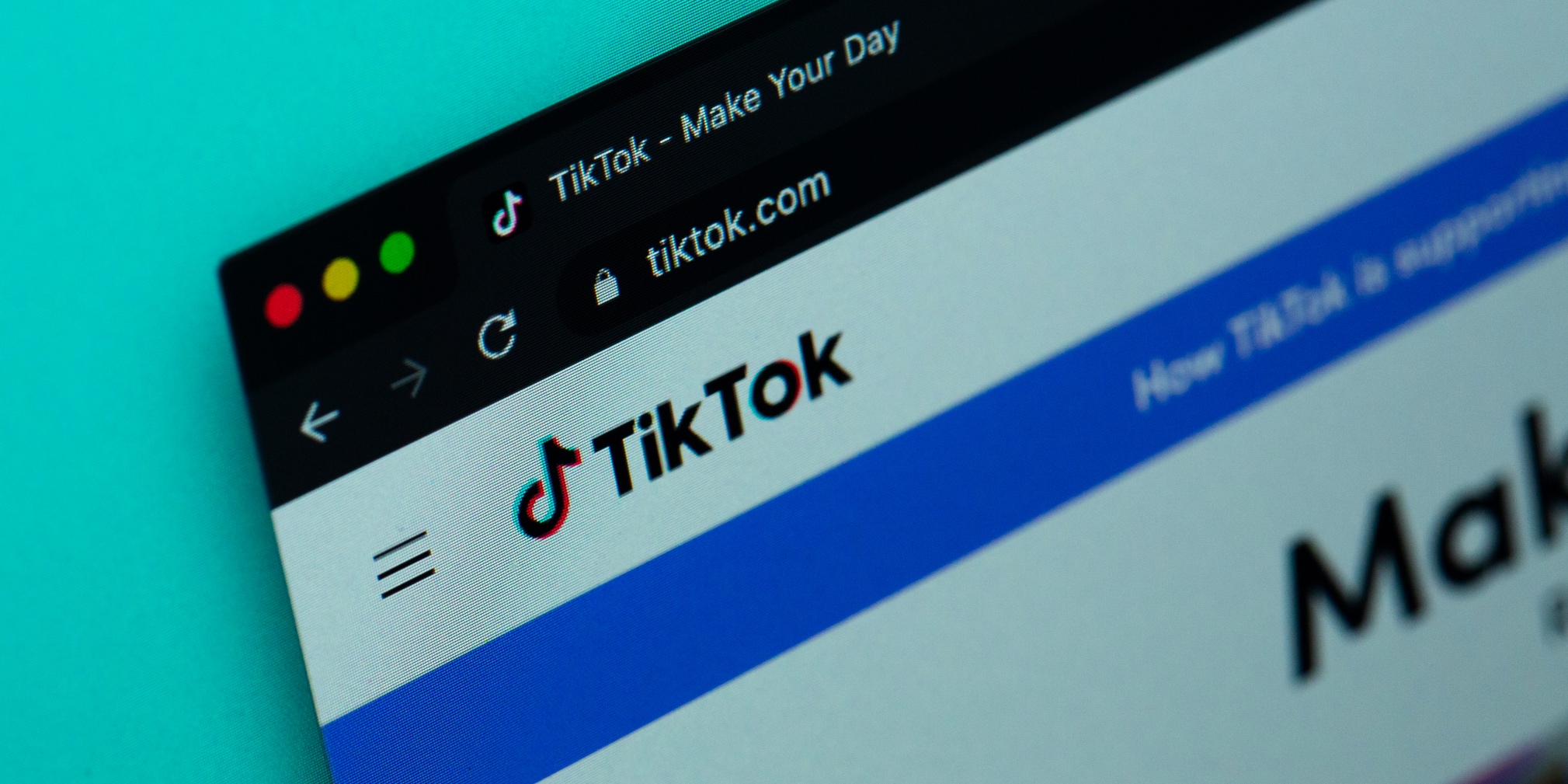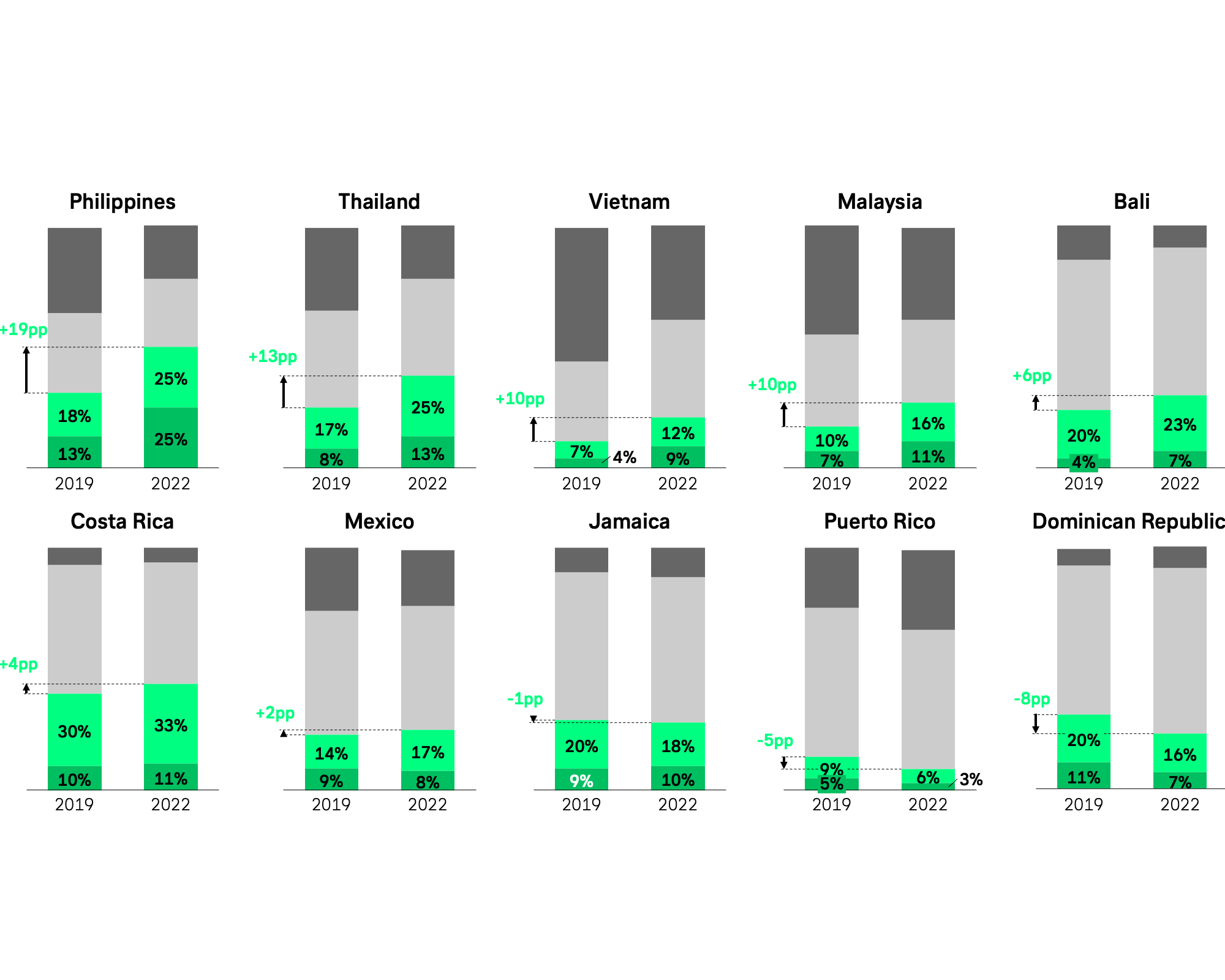In 2023, generative AI dramatically reshaped our approach to both personal and professional tasks.
Its transformative power is undeniable, as evidenced by ChatGPT becoming the fastest consumer app ever to reach 100 million users.
However, with great power comes great responsibility.
As generative AI has become more accessible, it has also paved the way for misuse, for example, in the form of fake reviews.
This trend poses a significant challenge across various sectors, especially in the travel industry, where the authenticity and trustworthiness of reviews are mission-critical.
For context: the vast majority of travelers heavily rely on reviews during trip planning and decision-making stages across all major travel categories.

In this analysis, we’re set to explore the impact of generative AI on travel in more detail.
We’ll highlight how it already undermines the current state of travel booking and suggest innovative approaches to tackle this issue.
But before doing so, let’s start by understanding the escalation of fake reviews in the broader context.
Understanding Fake Reviews in the AI Era
To begin our exploration, it’s essential to define what exactly constitutes a fake review.
Trustpilot offers a helpful definition:
- A fake review fails to represent a genuine service or buying experience.
- It is a calculated attempt to manipulate consumer perception or behavior.
In this context, it’s crucial to note that AI-generated reviews aren’t necessarily deceptive. Generative AI can assist in crafting an authentic review, reflecting a genuine user experience.
However, in our analysis, we predominantly classify AI-generated reviews as fake. This decision, based on our findings, demonstrates that these reviews are frequently utilized by commercial entities seeking to artificially manipulate ratings.
The Surge of AI-Generated Reviews
AI’s influence on consumer reviews is rapidly growing, and its impact is becoming more evident across various retail platforms.
Amazon, the world’s largest online retailer, serves as a prime example of this trend.
- According to Originality.AI, an AI text detection startup, there has been a fourfold increase in the use of AI in Amazon reviews in 2023 compared to 2022.
- This amounts to 8% of all reviews being AI-generated last year, marking a staggering 20-fold increase from the (mostly) pre-GPT era in 2020.

This trend isn’t limited to Amazon. G2, a well-known B2B software marketplace, observed that 5-8% of its reviews in 2023 were AI-generated.
However, the proliferation of AI-generated content isn’t the only driver behind the increase in fake reviews.
An extensive survey conducted by BrightLocal highlights another crucial factor: businesses directly incentivize consumers to produce fake reviews.
- In 2022, the number of consumers who reported being offered cash rewards for reviews doubled compared to 2021.
- Similarly, the frequency of businesses offering discounts for reviews nearly doubled.
Disclaimer: A Note on AI Text Detection Accuracy
While discussing the prevalence of AI-generated reviews, it’s crucial to acknowledge the limitations of AI text detectors, such as Originality.AI. Research has often pointed out the unreliability of these tools (see here and here). Even OpenAI’s in-house efforts at developing such a detector achieved only around a 26% accuracy rate.
Therefore, the specific figures presented in our chart above on the scope of fake reviews on Amazon should be approached with caution. However, since the same detection tool was consistently used on Originality’s Amazon dataset, which spans from 2020 to 2023, we can assume a relatively stable rate of false positives and accuracy issues across this time frame. This means that while the exact figure of 8% might not precisely reflect the true proportion of AI-generated reviews in 2023, the overarching trend of an increase in AI-generated content remains valid.
A Decline in Consumer Trust: The Ripple Effect of Fake Reviews
The surge in fake reviews has started to erode the trust consumers place in reviews. This could already be observed in 2022, so even before the widespread adoption of ChatGPT and co.
A growing skepticism was evident across almost all major review platforms, with one notable exception being Yelp.

This declining trust presents a significant challenge for platforms relying on user-generated content. It highlights the urgent need for more robust mechanisms to verify authenticity and maintain the integrity of online reviews.
The Impact of Fake Reviews on the Travel Industry
Fake reviews are becoming an increasingly prevalent problem across the board, with generative AI intensifying the issue.
But what specific impact is this trend having on the travel industry?
As indicated in the introduction, our analysis shows a concerning rise in fake reviews on key travel review platforms. Take TripAdvisor, for instance. The platform, pivotal in shaping travel decisions, has witnessed nearly a doubling of fake reviews from 2018 to 2022, according to statements from their respective Transparency Reports of the past four years.
It’s crucial to note that official figures for 2023 are not yet available. However, considering the trends observed on other platforms like Amazon, we might anticipate a similar increase on travel platforms. Assuming a rather conservative estimate, for example, a doubling of fake reviews (which is modest compared to Amazon’s quadrupling in 2023), this would imply that nearly 9% of all reviews on TripAdvisor in 2023 could be fake.

This scenario underlines the urgency with which the travel industry needs to tackle this issue. Authenticity in reviews not only guides consumer choices but also shapes the reputation of travel businesses. The infiltration of fake content onto these platforms can have far-reaching consequences, potentially misleading consumers and unfairly impacting businesses.
Beyond Simple Fake Reviews
The issue of fake reviews in the travel sector takes an even more sinister turn when we consider recent scam developments taking place.
- In August 2023, The New York Times uncovered a scam involving generative AI in the creation of full-length travel guidebooks.
- These weren’t just any books – they featured AI-generated author photos and biographies, creating an illusion of legitimacy.
- To further bolster their credibility, fake reviews were used to inflate ratings, luring unsuspecting customers into believing these were reputable travel guides.
- The final step in this deceitful strategy was undercutting the prices of established guidebook brands, making these AI-generated products seem like irresistible bargains.
- Many customers, enticed by what appeared to be a great deal, ended up purchasing these books. However, what they received was nothing more than a compilation of generic, AI-generated content – essentially worthless as a travel guide.
This practice began as early as March 2023, a mere few months after the release of ChatGPT, showcasing how rapidly and inventively malicious actors can adapt to new technologies.
Navigating the Evolving Landscape of Fake Travel Reviews
As we witness the accelerating wave of fake reviews (and even criminal spam tactics) fueled by generative AI, the traditional model of travel review platforms faces an uncertain future. Trust in these platforms is undeniably waning.
What does this mean for travel companies, especially OTAs, and their review functionalities?
Obviously, these platforms won’t vanish any time soon. Rather, the increase in AI-generated reviews will add layers of friction to the review-seeking process, potentially steering a portion of users away, especially if innovative alternatives emerge (which we’ll explore shortly).
If left unchecked, the phenomenon of fake reviews could effectively erode the very foundations of the user review system. However, there’s a silver lining: concerted efforts are being made to address this issue.
In a noteworthy initiative, major players from different industries, including Expedia Group, Booking.com, and TripAdvisor, have joined forces with Amazon, Trustpilot, and Glassdoor. This cross-industry coalition represents a unified front in the battle against fake reviews, with three out of its six members hailing from the travel sector, underscoring the magnitude of this challenge in our industry.
The involvement of such influential companies bodes well for curbing the tide of fake reviews. These organizations bring substantial resources and a long history of combating review manipulation to the table. Yet, generative AI presents a new challenge, redefining the dynamics of the review economy and opening doors for innovative solutions to emerge.
As we navigate this changing landscape, it’s evident that the battle against fake reviews is evolving, calling for fresh approaches and cutting-edge technologies.
In the following section, we’ll delve into the innovative strategies being deployed to counteract the impact of AI-generated reviews in the travel industry.
Addressing Fake Reviews: The NOW, NEW, and NEXT Companies
In response to the rising tide of fake reviews in the travel industry, a diverse range of companies are emerging, each offering solutions tailored to different time horizons.
Let’s explore these three categories: NOW, NEW, and NEXT.

NOW – Incremental Incumbent Innovation
In the immediate term, established players in the industry are innovating incrementally, enhancing their existing platforms to counteract the challenges posed by fake reviews. This approach is about refining what already exists, making it easier for users to navigate the information landscape and extract valuable insights from reviews. All major travel platforms already utilize some form of preventative detection, often mirroring how banks monitor transaction activity patterns for fraud. Of course, some fake reviews still slip through the cracks, so major companies are also deploying methods to help travelers reduce the need to scrutinize lots of reviews for authenticity
Let’s look at some examples of how incumbents are adapting:
- Google’s Review Highlights
This feature distills key information from a multitude of reviews, focusing on frequently mentioned topics. It helps users quickly grasp the essence of feedback without wading through potentially fake or misleading reviews.
- TripAdvisor’s AI-Generated Summaries
TripAdvisor has integrated generative AI itself to create concise summaries of hotel reviews, thereby incentivizing users to avoid reading individual reviews. This approach provides users with more reliable snapshots of guest experiences.
- Airbnb’s “Guest Favorites” Badge
Airbnb is introducing a new badge to build trust and reduce the reliance on sifting through individual reviews. This badge, akin to the well-regarded “Superhost” status, recognizes properties that consistently earn high praise from guests. It’s a straightforward indicator of quality and reliability, aiming to streamline the decision-making process for users.
NEW – Peer and Community Recommendations
A fresh wave of startups is also stirring up the travel industry by harnessing the power of peer and community recommendations. Backed by substantial venture capital, these new entrants are challenging the traditional travel review model.
Collectively, the three companies in our mapping have secured over $38 million USD in VC funding alone, signaling strong investor confidence in their innovative approaches.
These startups pivot away from the impersonal nature of mass reviews, instead betting on the authenticity and reliability of recommendations from trusted networks – friends, communities, or people with shared interests.
Here’s a snapshot of how they’re reshaping the travel recommendation landscape:
Atly: This platform reimagines travel suggestions through a map interface, fostering a space where groups and communities can exchange travel tips and recommendations.
Legends: By analyzing user data, such as photos, Legends crafts personalized travel profiles. It then curates recommendations based on users with similar interests and travel behaviors.
It’s Good: Focused on the culinary world, It’s Good is crafting a visually driven platform for food enthusiasts. Users can share their favorite dining spots and discover new ones, all within a network of fellow food lovers.
What sets these players apart from traditional travel platforms is their approach to discovery.
- Traditional platforms prioritize the travel service or product, with user reviews serving as a secondary consideration.
- In stark contrast, these new platforms foreground the personal connection – the recommendation comes from a known entity within a community, making the endorsement more trustworthy from the onset.
This model aligns seamlessly with the evolving travel landscape, where interests and niches increasingly drive demand, as highlighted in our analysis of “Communities Define Demand.”
Yet, it’s crucial to acknowledge that these platforms aren’t immune to manipulation. Issues like fake community members or biased recommendations can arise. Despite these potential challenges, the emphasis on community and trust might entice more travelers, especially as skepticism towards conventional review platforms grows.
NEXT – The Web3 Platform Shift
As the travel industry grapples with the escalating issue of fake reviews, a few pioneering companies are turning to blockchain technology to forge a new paradigm of trust. Among these, the UK-based Triend is particularly noteworthy for its focus on travel-specific applications, like hotel reviews.
Blockchain technology’s unique verification mechanism, achieved through tokenization, is at the heart of why it’s aptly suited to address fake review concerns.
Here’s how it works on Triend’s platform:
- When a traveler books a hotel using Web3, a distinct digital token related to that transaction is generated. This token, encrypted and stored on the blockchain, becomes a key to verifying the authenticity of subsequent reviews.
- Blockchain’s transparent ledgers enable complete traceability of a review, from the initial transaction to its eventual posting. This ensures reviews are from genuine customers who have experienced the service.
- Beyond verification, blockchain enables rewarding reviewers. Triend is pioneering this by offering NFTs linked to reviews. The platform evaluates review authenticity based on multiple factors like geolocation, multimedia evidence, transaction history, and identity checks. Higher authenticity scores attract better rewards from businesses.
As this example shows, the adoption of Web3 in travel is already underway, also evidenced by the increasing number of travel companies using the Camino blockchain network. Designed specifically for travel, Camino’s partners, including industry giants like Lufthansa, TUI, Fraport, Viator Group, and SIXT, have more than doubled from 2022 to 2023, according to our research.
Although transitioning the entire travel industry to Web3 is a colossal undertaking, especially for a sector known for its conservatism, these early adopters signal a strong belief in blockchain’s potential.
If widely applied to travel reviews, Web3 could significantly enhance their authenticity, variety, and volume while also engaging travelers through innovative reward mechanisms.
In the interim, companies like Triend are bridging the gap with Web2-compatible tools, providing a seamless transition towards this groundbreaking technology.
Speculating About the Future
As the travel industry grapples with the accelerating phenomenon of fake reviews, it’s clear that the landscape is on the cusp of significant change.
While incumbents are taking strides to address this challenge seriously, it’s likely that they will gradually lose market share to more innovative, emerging solutions.
The promise of peer and community travel recommendations lies in their ability to minimize the friction of verifying information, thanks to the inherent trust in the source. However, these platforms hinge on achieving mass traveler adoption to create a network effect and unlock their full potential. The diminishing trust in current review systems could well be the impetus needed for these platforms to attract the critical mass necessary for a robust network effect.
Blockchain technology presents the most comprehensive solution to the fake review conundrum. However, its success is contingent on widespread adoption within the travel industry. With its tokenization and verification mechanisms, blockchain assures that reviews can be directly linked to specific travel transactions, bolstering trust and authenticity. Transforming reviews into digital assets and rewarding travelers for genuine reviews could broaden participation in review ecosystems, enhancing both the quantity and quality of information available for businesses.
In the face of an increase in AI-generated fake reviews, the industry might also pivot towards video and image-based review platforms. Given the current challenges in generating authentic-looking videos and images through generative AI, this shift could add a layer of credibility to user-generated content. However, this transition also brings its own set of challenges and complexities. And it might only be a question of time until AI-based image and video quality levels improve to a level where it’s hard to differentiate between fake and real.
Nevertheless, in our view, the escalating issue of fake reviews, propelled by advancements in AI, will be the catalyst for a transformative shift in how the travel industry manages and values customer reviews.
The future, while uncertain, is ripe with possibilities for further innovation and change.













